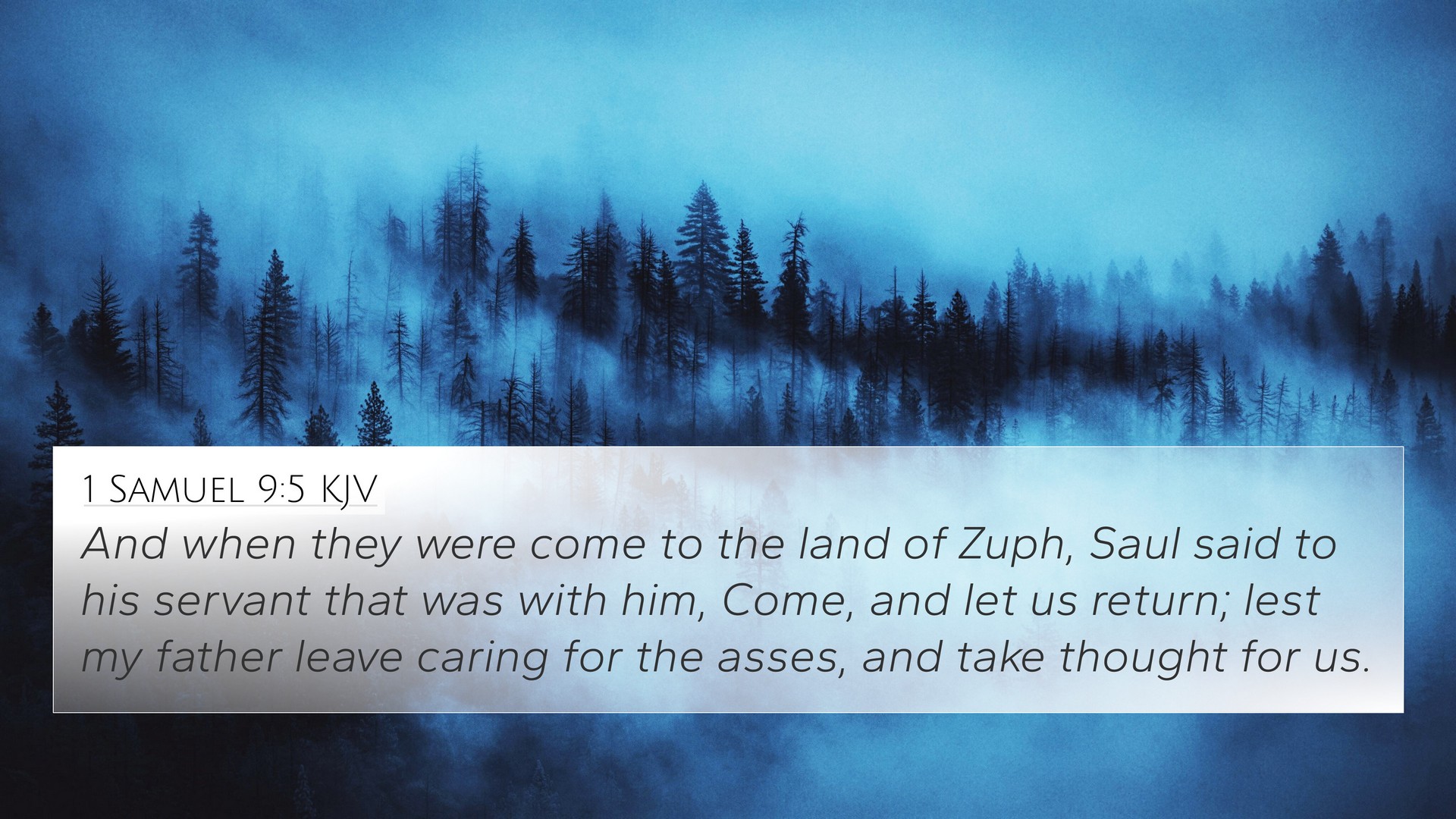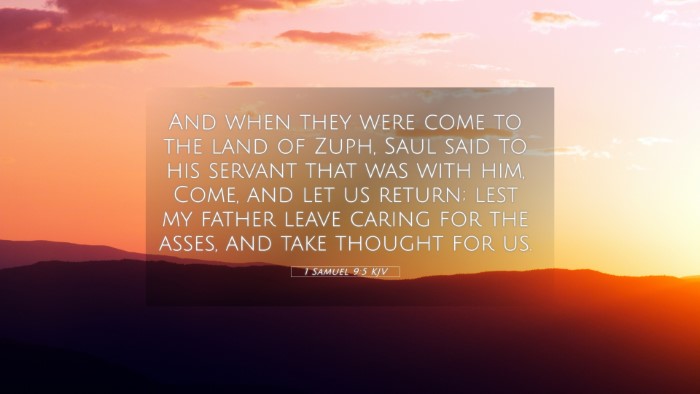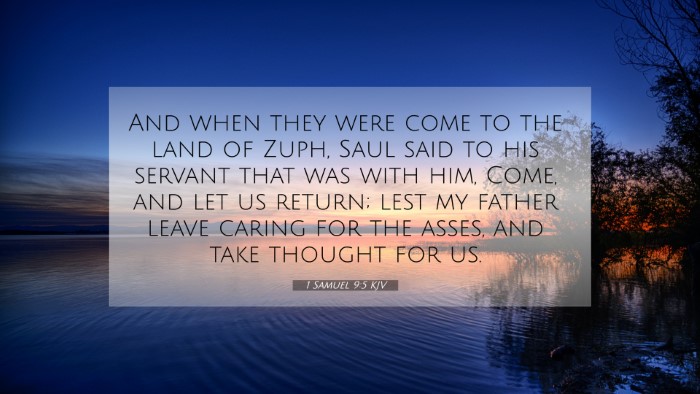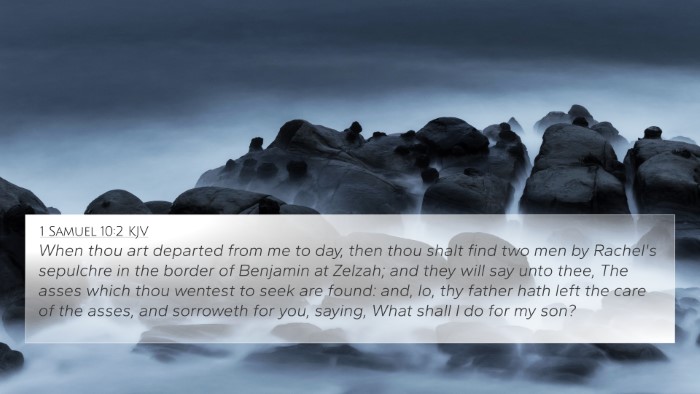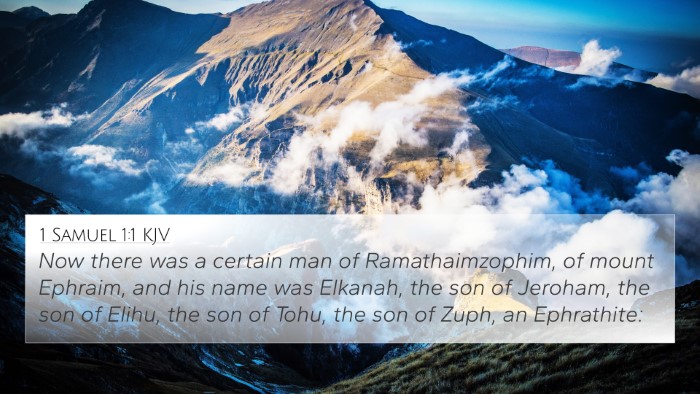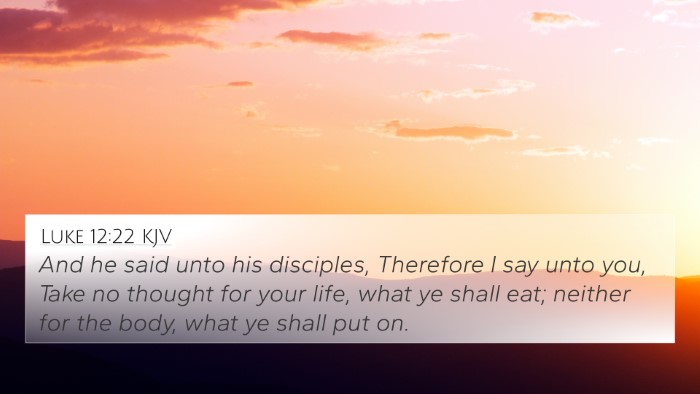Understanding 1 Samuel 9:5
Verse Text: "When they came to the land of Zuph, Saul said to his servant who was with him, 'Come, let us return; for today we shall become lost in our searching.'"
Summary of Insights
This verse captures a pivotal moment in the narrative of Saul's rise to kingship in Israel. The search for the lost donkeys appears to be a mundane task, but it becomes the catalyst for Saul's anointing as king. Several commentaries provide valuable insights into the implications of this verse.
Matthew Henry's Commentary
- Contextual Awareness: Henry highlights Saul's journey as more than a mere search for lost donkeys; it symbolizes God's unseen hand guiding events in mundane matters.
- Choice and Determination: He reflects on Saul's realization that after an exhaustive search, it might be prudent to return; this also suggests a lesson in perseverance despite unclear outcomes.
- God's Sovereignty: Henry points out that God orchestrated this search for His purpose, which indicates a divine plan at work beyond human understanding.
Albert Barnes' Notes
- Lost in Search: Barnes expounds on the metaphor of being lost, suggesting that it could also represent Saul's spiritual state as he is unaware of his impending destiny.
- Servant's Role: He emphasizes the importance of the servant in this narrative, drawing parallels to how God often uses unlikely individuals to reveal His plans.
- Sensitivity to God's Leading: The notion that they should return signifies an awareness of divine timings and circumstances that may redirect one’s efforts.
Adam Clarke's Commentary
- Geographical Significance: Clarke notes the importance of Zuph's location, symbolizing the broader journey of faith and the idea of moving in obedience even when not knowing the outcome.
- Lessons in Leadership: He connects this moment to themes of leadership emerging through humble beginnings—illustrating that greatness can arise from seemingly trivial circumstances.
- Underlying Faith: Clarke posits that Saul's leadership journey began with faithfulness in small matters, suggesting that God often builds great destinies on minor acts of obedience.
Cross-References
1 Samuel 9:5 relates deeply to various other passages, highlighting connections and themes that emerge throughout Scripture:
- Proverbs 16:9: "The heart of man plans his way, but the Lord establishes his steps." - Reflecting on God's guiding hand.
- Isaiah 55:8-9: "For my thoughts are not your thoughts, neither are your ways my ways, declares the Lord." - Emphasizing God's higher plans.
- Jeremiah 29:11: "For I know the plans I have for you," declares the Lord, "plans to prosper you and not to harm you." - Affirming God's purpose in life's journey.
- Romans 8:28: “And we know that in all things God works for the good of those who love him.” - Connecting to the theme of divine providence in everyday events.
- Acts 13:22: “...I have found David, the son of Jesse, a man after my heart, who will do all my will.” - Comparing the selection of leaders throughout Israel's history.
- 1 Samuel 10:1: “Then Samuel took a flask of oil and poured it on his head...," - Saul’s eventual anointing as king is foreshadowed here.
- Psalm 37:23: "The steps of a man are established by the Lord, when he delights in his way." - Affirming divine guidance in the journey.
Connecting Themes
The themes emerging from 1 Samuel 9:5 connect both Old and New Testaments, illustrating that the journey to leadership and divine appointment is often fraught with ordinary trials that prepare a person for greater tasks.
Inter-Biblical Dialogue
This narrative finds numerous parallels across the Scriptures, showcasing how seemingly trivial moments embody profound spiritual truths:
- Exodus 3:1-10: Moses, tending sheep, is called to lead God’s people, drawing parallels to Saul's journey.
- Luke 16:10: “One who is faithful in a very little is also faithful in much..." - Teaching the principle of faithfulness in small things before being entrusted with greater responsibilities.
Conclusion: Through the learning derived from 1 Samuel 9:5, we understand that God often works through our ordinary pursuits and that these can lead to extraordinary divine encounters. This scripture invites readers to recognize God's active presence in their daily lives and to respond to His calling with faith and diligence.
